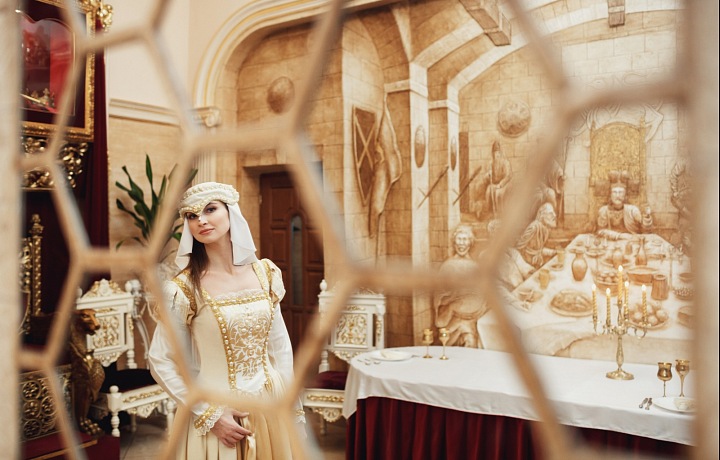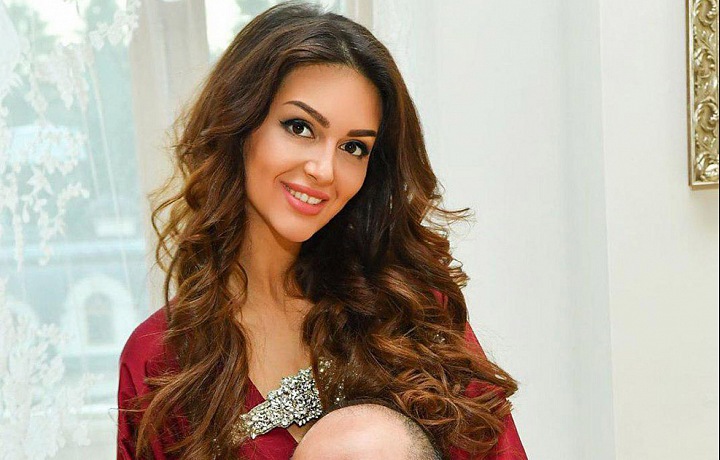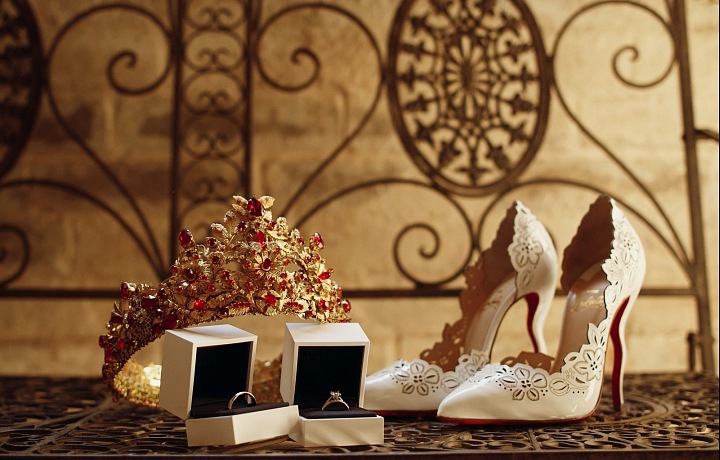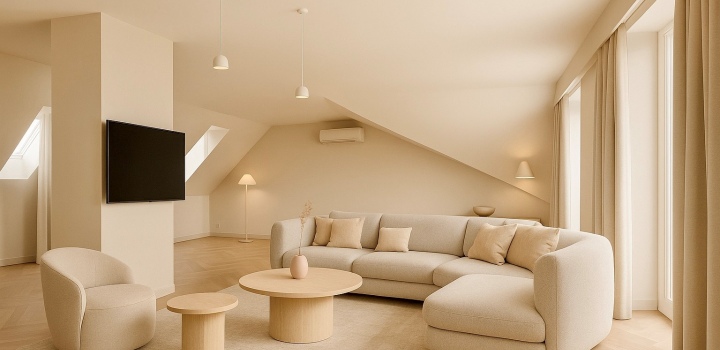I'm taking the Sultan: A wedding is a ticket to a world of power and luxury that an ordinary mortal cannot imagine
Marriage with a sultan, an idea that combines exoticism, power, golden palaces, and strict court protocols. It's not just a title from a romantic novel or a plot of a Turkish telenovela. For some women around the world, this dream has become a reality. From ordinary civilians, they became princesses or queens of Islamic monarchies and lived alongside men they called "Your Highness". But what does such a marriage entail? And what does it actually mean to marry a sultan?
Who is the sultan and where do they rule today?
The sultan is a traditional title of ruler in the Islamic world, which appeared already in the 10th century. Originally it denoted "one who has power", later it was established as a title of an Islamic ruler, often with both religious and secular authority. However, it is not a universal designation for all Islamic rulers. In some countries, the terms emir, sheikh or king are used.
Where do sultans exist?
Although most of the world's monarchies have either disappeared or transformed into parliamentary systems, sultans still exist in several countries, particularly in Asia and Africa:
- Malaysia - the country has a unique system: each of the 9 hereditary sultans of individual Malaysian states alternates as king (Yang di-Pertuan Agong) of the entire country for 5 years. Each of them is a "sultan" in his state - for example, the sultan of Kelantan (Muhammad V.), sultan of Johor or sultan of Perak.
- Brunei - the absolute ruler Sultan Hassanal Bolkiah is one of the richest people on the planet. He is not only the head of state, but also the prime minister, defense minister, and minister of finance and religion.
- Oman - until recently, Oman had Sultan Qaboos, today the ruler is Sultan Haitham bin Tariq. In Oman the sultan is the head of state and government, much like in Brunei.
- Indonesia and some parts of Africa - even though they no longer have official political power, there are ceremonial sultans, for example in Yogyakarta (Java island), where the sultan also holds the position of governor.
- Turkey - once the most famous empire with a sultan was the Ottoman Empire, where the sultan ruled from the 13th to the early 20th century. The last Ottoman sultan, Mehmed VI. was overthrown in 1922, when the Republic of Turkey was founded.
Curiosities from the world of sultans:
- The Brunei Sultan has a collection of more than 7,000 cars, including dozens of golden Rolls Royces.
- In Malaysia, a sultan can marry a civilian, but for her to become a sultana, she must convert to Islam, and that's only if it is approved by the court council.
- Some sultans have multiple wives, but the public often only knows the "official", representative one.
- Sultanic palaces are often the largest inhabited buildings in the world. For example, the Istana Nurul Iman in Brunei has more than 1,700 rooms.
- In some areas of Africa, the traditional selection of a sultan based more on tribal rules than on inheritance is still practiced.
Love or alliance?
At first glance, it may seem that marriage to a ruler is the result of great love and romance. In reality, such unions are often strategic, diplomatic, or carefully planned within family or religious rules.
Sultans hold a high position in the Muslim world, and therefore it is expected of their partners to be not only loyal but also to respect traditions, dress, faith, and lifestyle. For a non-Muslim woman, this means converting to Islam, changing her name, and often giving up her own identity.
In the case of the Czech woman who became a Malaysian sultana, her name was changed from Jana Jakoubková to Sultanah Nur Diana Petra. She had to accept not only a new culture, but also a new way of life where privacy becomes a luxury and freedom is subordinate to the etiquette of the royal court.
Mandatory conversion to Islam
Most sultans (especially in Malaysia, Brunei or Oman) are practicing Muslims and their marriage is bound by Islamic law - Sharia. It strictly requires that a Muslim man marry only a woman who is either a Muslim, or belongs to the "people of the book" (a Christian or a Jew). In practice however, this means that if a woman wants to obtain the status of an official wife of the sultan and not just a concubine, she must convert to Islam. The conversion is performed before the Islamic council (in Malaysia through the "Jabatan Agama Islam"), where the woman publicly declares the shahada (Islamic profession of faith). Sometimes the conversion is more a "formal act", but in more conservative areas, the woman is also expected to actively observe Islamic life - prayers, fasting, veiling.
Name Change and Public Identity
After conversion, a woman often adopts a new, Islamic name, symbolizing the birth of a "new person". This name isn't just a social gesture. In a culture where hierarchy, protocol and religion are tightly connected, changing the name is accepting a new societal status and at the same time renouncing one's own national and spiritual identity.
Renouncing Civil Rights and Freedoms
A woman who marries a sultan often gives up personal freedoms she took for granted in her home country. Every move can be monitored, public appearances will be governed by protocol. Any statement in the media, on social networks or in conversations is under the scrutiny of the palace. In some cases, women are completely forbidden to talk about the privacy of the royal family. A married woman may not always have the right to leave the country alone without her husband's consent.
Loss of own culture and family
Many women after marrying the Sultan leave their own country and renounce their citizenship to obtain the status of a royal partner. They may also have limited contact with their family, especially if they live in a monarchy where communication with the "impure" world is considered risky. Their origin is not publicly stated in order to emphasize unity with the new culture. This is also the case with the already mentioned Sultana Nur Diana Petry, information about her life before the wedding was long kept secret.
Being a sultan's wife often means living in a golden cage. Although the woman is surrounded by luxury, she may experience loneliness, isolation from the world, or even hostility from the royal family or the public. In some cases, other wives or court members never accept the woman, and she becomes a "necessary evil", especially if she comes from a non-Islamic and "white" world. Divorcing such a man can be extremely difficult and publicly disgraceful.
What does a wedding with a sultan look like?
Monarchs' weddings are usually lavish, grandiose, carefully orchestrated events that are watched by the entire nation, and sometimes the entire world. A wedding with a sultan involves a combination of religious Islamic rituals, traditional ceremonies of the region, and official state ceremonies. The wedding day is not just about two people, but about reassuring the subjects that the royal family continues and remains stable.
The bride must prepare for several changes of dress, sometimes as many as five or six, all embroidered with gold, silk and precious stones. Hair is covered with a veil or scarf, often in accordance with Islamic regulations on covering. The basis is the Islamic wedding ceremony called nikah. This is strictly divided. Part is religious, where the imam performs the nikah (Islamic marriage), and part is ceremonial, where the couple is officially introduced as the royal married couple.
Sultan weddings, especially in Brunei or Malaysia, are extravagant ceremonies lasting several days. An example is the wedding of Prince Abdul Mateen of Brunei in January 2024, which included: a ride in a golden carriage drawn by horses, beautiful traditional robes adorned with gold, sapphires and embroidery, a splendid feast for thousands of guests, a royal procession and an honor guard.
From civilian to princess
For a woman who marries a sultan, everything changes - not just her name, nationality and religion, but also her daily life. She can no longer shop in a store, just go to the cinema or walk down the street. Everything is planned, secured, controlled. Every gesture, dress and expression can be interpreted as a representation of the entire monarchy.
At the same time, though, she gains the ability to influence charity, education, health care, and women's rights. In many cases, the wives of sultans become significant philanthropists. But all this comes in exchange for personal sacrifices.
What does a woman gain by marrying a sultan?
Marrying a sultan is not just a romantic fulfillment of a fairy tale dream, but also a ticket to a world of power, privileges, and luxury that an ordinary mortal cannot imagine. Besides prestige, there are specific benefits that marriage to a ruler brings, and these are often conditional on the relationship working - after divorce, a woman can lose most of them.
Royal Title and Social Status
After the wedding, a woman is usually given a title such as "Her Royal Highness", "queen", "princess" or "Raja Permaisuri" (in Malaysia). She automatically becomes a member of the royal family, thereby entering the elite of the nation. Her name and face appear in the media, at banquets, state celebrations, or during foreign visits.
Luxurious Lifestyle
The luxurious lifestyle of the sultans is a fascinating combination of the royal family, extreme wealth, and unlimited comfort.
Private flights and yachts are a matter of course, as is wearing jewelry and clothes from the most prestigious fashion houses in the world - favorites include Dior, Cartier, Elie Saab or Van Cleef & Arpels. Due to their status, they have unlimited access to the royal property and their foreign trips are paid for from the state budget, which further deepens their position of untouchable elite. Although this lifestyle is unimaginable for many, in some countries it is still a reality, in which tradition, wealth, and power intertwine.
Financial Security
Part of the marriage to the Sultan also includes a so-called dowry, known in Islamic tradition as mahr. It is a rich financial or material gift that the groom is obliged to give to the bride when getting married. It can take many forms, from luxury jewelry, valuable land, to millions in cash.
In addition to the dowry itself, the Sultan's wife often has the right to lifelong monthly allowances, which provide her with a high standard of living, special resources for her needs, and in case she has children with the Sultan, a favorable inheritance status.
Some of the Sultan's wives decide to actively participate in public life. They establish foundations, engage in charity or even open their own businesses. These projects are often generously funded directly from the royal court, which makes the wives not only representative figures of the monarchy, but also influential personalities with real power and influence.
Cultural and Historical Significance
The Sultan's wife not only contributes to the social life of her time, but also to the history of the monarchy as an integral part of it. Her name, story, and work can have a value that lasts for generations, especially if she was active, inspiring, and representative.
In some cases, she becomes an admired figure in the public, often perceived as a "modern princess", linking tradition with a new age. It is precisely this balance between royal protocol and a human approach that brings her popularity, respect, and positive perception at home and abroad. In people's eyes, she can serve as a symbol of beauty, elegance, but also hope for change.
Life after marriage
If a woman thinks that after marriage the fairy tale of "happily ever after" is always true, it may not be. The sultan's court can be influenced by politics, intrigue, and sometimes even jealousy. Many rulers have more than one wife or concubine, although this is now increasingly limited. Western women who marry a sultan often have to face rejection or suspicion from the public.
In addition to this, divorce can occur in some cases. A warning example that marriage to a sultan can also lead to the unknown is the case of Oksana Voevodina, a Russian model and Miss Moscow 2015. In 2018, she married Sultan Muhammad V - yes, the very same man who is now married to a Czech woman. After the wedding, she adopted the Islamic name Rihana Oksana Petra and was expecting their joint child. News of their divorce emerged in July 2019, with the sultan allegedly using the Islamic divorce procedure "talak tiga", the strictest form of divorce in Islamic law. The sultan abdicated the throne and divorced her through an Islamic court, allegedly without her knowledge.
Oksana claimed she learned about the divorce from the media. Subsequently, she was publicly stripped of the Sultanah title and the sultan questioned the paternity of their son. Their conflict has moved into the public space. The Duchess has been demanding long-term recognition of the child as a legitimate descendant. This story serves as a warning that life in the royal cage can be golden, but often not free and unpredictable.
And speaking of divorce, do you want to know how a divorce from the sultan proceeds?
Divorce with the sultan
Divorce with the sultan is possible, but it is a sensitive and strictly controlled matter, which is governed by Islamic law (Sharia) and royal protocol. It's not just a family affair, but also a matter of public image of the monarchy. In each country where the sultan rules, divorce can have various social or legal consequences, especially for the woman.
How divorce works
In Islamic law, "talaq" is a form of divorce, which can be initiated by a man, including the sultan himself, by saying the word "talaq" three times. This word means "divorce" and must be pronounced clearly, consciously and intentionally. This can be said all at once, but more often it is repeated gradually over three different periods, to create space for possible reconciliation.
After the third pronouncement of talaq, the marriage is considered irreversibly terminated unless reconciliation has occurred in the meantime.
After the pronunciation of talāq follows a waiting period, called iddah, which usually lasts three months. During this time, the woman stays in her husband's house and the couple can continue in the marriage without a new wedding ceremony. However, if there is no reconciliation and the man repeats the divorce decree three times, the marriage is legally ended. In royal circles though, it is not just a private affair. Divorce must also go through a formal process, often involving a religious authority, judicial council, and the royal court. The result is a public announcement that has not only legal but also social weight. The wife is stripped of her title, privileges and officially leaves the royal family.
The divorce of the Sultan of Brunei, Hassanal Bolkiah, from his second wife Mariam in 2003 was one of the most notorious cases of separation in royal Muslim circles. Although Mariam was regarded as "Her Royal Highness" during her marriage and had access to a luxurious life in the palace, she lost all these privileges after the divorce. She lost her official title, influence in the monarchy, and her place in the social ladder that was rightfully hers as the Sultan's wife.
Consequences for the wife
The former wife is sometimes paid a high severance or retains the mahr, that is, the dowry, which was part of the original wedding contract. The amount of this severance can reach millions of dollars, often involving jewellery, real estate, or private residences. It should also be noted that polygamy is legal in many Muslim monarchies and a sultan can have several wives. Usually, only one, the "official" or "first lady", who performs representative tasks, is visible. Pregnant wives remain out of public interest.
Divorces are rarely publicly announced in royal families. They are often handled discreetly, so as not to damage the image of the monarchy, disrupt the dignity of the ruler, or cause social shocks. Secrecy is also a common part of the protocol and confirms that even in the luxurious world of royal halls, some truths are meant only for the initiated.
Romantic dream or golden cage?
Although marrying a sultan is a dream of many women, exotic, noble, and full of prestige, it can also be very demanding. It is a compromise between personal happiness and duty, between romance and protocol. Many women manage this path with grace, others fail on it. One thing, however, is certain: it is not a wedding like any other - it is a life-changing event that forever divides life into "before" and "after".
Would you like to marry the sultan, even if it meant giving up everything you know? Or is your own "king" of flesh and bones enough to brew you coffee in the morning without court etiquette?
Source: author's text, todayonline.com, Reuters.com, bbc.com, aljazeera.com, theguardian.com

























